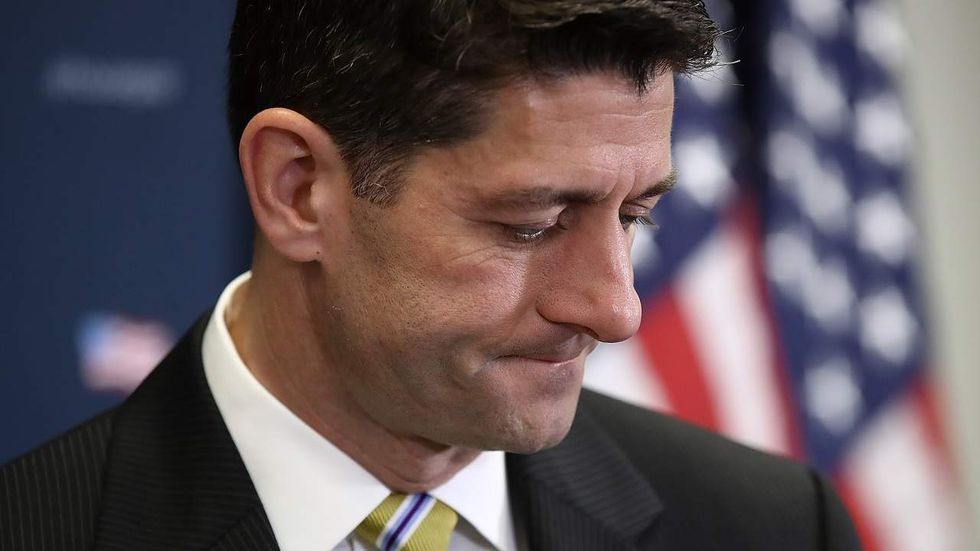
(Photo by Win McNamee/Getty Images)

The media is breathlessly telling us all about Paul Ryan’s past—doggedly digging into who and what he read, who influenced his concepts of the free market and government, the source for his beliefs on everything from natural rights to social justice.
Gee, if only we had this kind of vetting of Barack Obama.
In no time, the media will be asking about mentors that influenced Ryan. Of course, that’s a totally natural question. We always ask these things of people who get this close to the White House. That is, with the exception of Barack Obama.
Why is Obama an exception? The answer is because Obama’s mentor was a man named Frank Marshall Davis, a literal card-carrying member of Communist Party USA—card number 47544.
I know Davis well, having written a book on him, titled The Communist. Davis was an African-American man born in Kansas before moving to Chicago and Hawaii. He joined the Communist Party during World War II. When the war was over, he became founding editor of the Chicago Star. After that, he moved to Hawaii and wrote for another Party publication, the Honolulu Record.
In these columns, Davis wrote pro-Soviet propaganda, with his chief targets being the Democrats in the White House opposing Stalin. He trashed Harry Truman and the Truman Doctrine and the Marshall Plan—not to mention Winston Churchill. Davis advocated all sorts of things that remind us of President Obama’s policies today, from pushing taxpayer-funding of universal healthcare to subsidizing “public works projects” that Davis insisted would keep America out of another Great Depression. Davis used constant class rhetoric, bashing Wall Street, the wealthy, corporate executives, and profits. His Chicago Star blasted GOP tax cuts that “spare the rich” and “benefit millionaires” and “hurt the poor.”
When I hear Obama and David Axelrod’s newest class-based attacks on Paul Ryan, it immediately reminds me of Davis.
Davis’s communist agitation was so blatant that Senate Democrats called him to Washington to testify in December 1956. Most remarkable, Davis’s 600-page FBI file reveals that he was repeatedly retained on the federal government’s Security Index, meaning that if war broke out between the United States and Soviet Union, he could be placed under immediate arrest.
What kind of an influence did Davis have on Obama? Liberal journalists hounding Paul Ryan might want to take note: One Hawaiian source, Dawna Weatherly-Williams, so close to Davis that she called him “Daddy,” and was present the moment Davis and a nine-year-old Obama first met in 1970—the start of a decade-long relationship—says Davis “influenced Barack … about social justice, about finding out more about life, about what’s important, about how to use your heart and mind.”
Another source, Dr. Kathryn Takara, Davis’s biographer and friend of 15 years, so close that she talked to Davis the day he died, says Davis instilled in Obama his very belief in “change.” That “change” became the one-word mantra for the entire Obama 2008 campaign and political movement.
Another Hawaiian source, Ron Jacobs, states that Davis told Obama about writers like Langston Hughes and W.E.B. DuBois, prominent black communists. Davis had their books, and knew Hughes personally. They served in communist fronts and causes.
In Dreams from My Father, Obama acknowledged Frank Marshall Davis, “his books,” and his “hard-earned knowledge behind the hooded eyes.” In fact, Obama referred to “Frank” dozens of times. He is mentioned in every section of Obama’s bestselling 1995 memoir, not just in Hawaii but as Obama leaves for the wider world: Europe, Africa, Chicago. The moment when Obama at last arrived in Chicago to find himself politically and professionally—just as Frank Marshall Davis had done 50 years earlier—he thinks of “Frank,” literally imagining him there.
And yet, not once in the entire memoir did Obama disclose Davis’s full name—no doubt because Obama realized the political sensitivity of acknowledging such a radical mentor.
Tellingly, when Obama released an abridged audio version of Dreams from My Father in 2005, every single reference to “Frank” was purged. The old communist suddenly found himself on the emergent presidential candidate’s blacklist—and with Obama’s approval. The back cover of the Obama-narrated audio book states: “This abridgement has been approved by the author.”
Does the mainstream media have any interest in this?
I’ve had not a single inquiry from the mainstream media. Nothing from the New York Times and Washington Post, the latter of which did a scandalous expose of Mitt Romney’s alleged bullying during his high-school years. Well, what about Obama’s high-school years? Obama was influenced by a man so radical that he was listed on the Security Index!
To the contrary, at this time four years ago, the Post published a 10,000-word feature on Obama’s Hawaii years. It didn’t contain a single mention of Frank Marshall Davis. Not one.
My book reached number one in non-fiction at Amazon and Barnes & Noble.com. It made the top 10 on the New York Times bestseller list. And still, the press is completely ignoring Frank Marshall Davis. That ignoring will continue, as that same press wildly digs into the past of Mitt Romney and Paul Ryan.
Paul Kengor is a professor of political science at Grove City College, executive director of The Center for Vision & Values, and author of The Communist: Frank Marshall Davis, the Untold Story of Barack Obama’s Mentor.